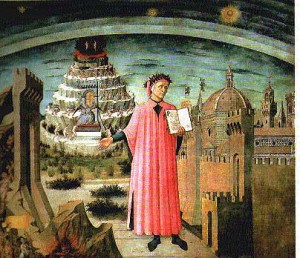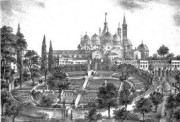The Origins
Durante Alighiero Alighieri (Florence 1265 AD – Ravenna 1321 AD) called “Dante”, is probably the most famous Italian poet of all time, thanks to its comedy, also called “The Divine Comedy”, now considered the greatest work of Italian literature and one of the most important of the universal’s. When he was very young he lost his mother Donna Gabriella Abati, also known as “Bella”, and his father: Alighiero Alighieri da Bellincione. He had a half-brother and a stepsister: Francesco and Gaetana.
Education
Dante Alighieri went to the Franciscan (Holy Cross) and Dominican (Santa Maria Novella) schools, where he learned theology, physics, astronomy, grammar, rhetoric and philosophy. Although his school culture made him appreciate the Roman Poet Virgil, Dante was also very attracted by some French and Italian Poets (Tuscans and Sicilians ). Dante also learned very well the vernacular and Provencal languages, which then used in some of his works. At the age of eighteen, he met some young Poets, who used to call themselves “the Stilnovisti”, as Brunetto Latini (also mentioned in the Divine Comedy), a teacher of rhetoric, grammar, philosophy, courteous and French literature. Brunetto Latini inspired Dante so much that he moved from the typical scholastic Latin literature of the Middle Ages, to attain to a more introspective, romantic, and anthropocentric writing, typical of the forthcoming Renaissance. Still young (twelve-yeas-old), Dante was promised to Gemma Donati, daughter of an important Florentine family, with whom, when he turned twenty, married, and had four children: Antonia, Jacopo, Giovanni and Pietro.
The Florentine Political Life
Still young, Dante enrolled in the famous “Art of the Doctors and the Pharmacists,” and this move allowed him to enter the political life of the Republic, prohibited, in those days, to the old nobility. Dante at that time, began an active political life, first becoming a member of the People’s Council, in November 1295; then entering the Group of Wise Men, in December 1296, and finally joining the Council of One Hundred in May 1296. He was also an Ambassador in some political missions and, in 1300 AD, became a Prior ( highest exponent of an Art ), entering the Government of the Republic of Florence. Dante came from a family belonging to the political wing of the White Guelphs ( moderate supporters of the Pope), diametrically opposed to the Ghibellines (absolute supporters of the Emperor). In those years the Ghibellines were defeated by the Guelphs and forced to leave the City, which later came under the control of the Guelphs. The Guelphs, then, split in two main factions: the White Guelphs and the Black Guelphs. The White Guelphs supported the Pope as the greatest exponent of Ecclesiastical power, but did not accept his interference in the political life of Florence, and did not completely exclude the possible return of the Emperor; the Black Guelphs, instead, wanted the Pope were the sole owner of both the Spiritual and Temporal power. In Florence, the conflict between blacks and whites broke out. Dante, who, being in the Council of One Hundred, had temporarily exiled the leaders of the two factions, received a harsh lesson for this action. Pope Boniface VIII, indeed, sent one of his men (Charles of Valois) to Florence, as a peacemaker among the two factions, but at the beginning of the first riots, he took the control of Florence, and afterwards he appointed Cante Gabrielli, belonging to the Black Guelph faction, as the new Mayor. Cante began to persecute the leaders of the White Guelphs, including Dante, who was convicted of embezzlement and tax evasion, exiled from Florence and stripped of all his possessions while he was on a diplomatic mission in Rome. He never returned to his beloved City, despite some attempts with both the armed struggle and diplomacy, unfortunately useless. Dante then wandered for several Italian Cities, whose Courts all received him very well: Verona, Lucca, Forlì, Ravenna, and perhaps Paris. During this long pilgrimage, he wrote many wonderful books, including the immortal Comedia (The Divine Comedy).
Beatrice
The life of Dante and his works were undoubtely influenced by his platonic and immense love for the wonderful Bice Portinari, dubbed Beatrice, daughter of Folco Portinari, a wealthy banker who lived near the Alighieri. Dante met Bice at the age of nine and immediately fell in love with her, even if it seems they never talked to each other, not even once. She never reciprocated him, and, unfortunately, it seems, she even ridiculed him publicly. Despite the untimely death of Beatrice, in 1290 AD, and in spite of the marriage and the four children, Dante never stopped thinking of her as the woman of his dreams, and she was without undoubtely the main inspiration that led him to write several extraordinary books.
Death of the Poet
Dante died at the age of 56, in September 1321 AD, in Ravenna for a bout of malaria, contracted during a trip to Venice, Ravenna is the City which preserves his remains in the tomb dedicated to him.
Works:
Vita Nova (New Life) (1292 AD -1293 AD ?): A work dedicated to “his” Beatrice, consisting of 42 chapters written in prose and partly autobiographical. Dante here, explains some famous poems of the time, by inserting this explanation in a very homogeneous texture. Rime (Rhymes): many writings, assembled by some contemporary publishers, who have combined the compositions of the early years of the Poet with those of his mature years. The years of his youth in Florence, where Dante indulges in vulgar pleasures and the years of maturity, in which the poet has begun to break away from worldly pleasures, by taking the path towards the more philosophical aspects of existence. Petrose Rime (Stony Rhymes) (1296 AD): a hard work, probably dedicated to a beautiful woman named Petra (she may also have been the wife Gemma Donati), who behaved in a detached and glacial manner. De Convivio (Convivio) (1304 AD -1307 AD): this unfinished work, written in the vernacular tongue, is a collection of essays, intended for those who, because of social status, have not been able to study, having neither a normal nor a small chance to do it. De Vulgari Eloquentia (1303 AD): a literary work consisting of a book and 14 chapters included in a second one. Dante here analyzed the many dialects spoken in Italy. Although he continued to consider the Latin language as a cultured and superior language, he also strongly defended the many vulgar languages and their emotional power, coming from their Cities. Dante aimed to unify the many vulgar Italian dialects into a single, national, vulgar Italian language, which should have a strong dignity and go side by side with the Latin language. De Monarchy (the Monarchy) (1310 AD – 1313 AD): a work of political analysis, written in Latin, where Dante realizes that only a universal monarchy, could be useful for a worldly happiness of men. The spiritual power of the Church must carry out its task, and the temporal power must be allocated to the Emperor. The Comedy (1300 AD – 1321 AD), a unique and extraordinary work, considered the most important literary work of all the Middle Ages and one of the most relevant of the universal literature. The work, written in Tuscan vernacular dialect has a “comic” style, far from being aulic. The book is divided into a preface to the entire text (introduction), and other three main parts (Hell, Purgatory and Paradise), composed of 33 songs each. . The book is about an incredible journey of the Poet in the Afterlife: after losing the straight path (justice) and getting lost in a dark wood (sin), Dante sees the sunlight and try to get out of the woods but, he maust cope with a lynx (lust), a lion (pride) and a wolf (greed), so he slides down a slope and the bottom of it he meets the soul of the great Poet Virgil, who tells him that to get out safely and avoid the three beasts he needs to follow a different path, much longer and more difficult, between good and sin’s regions. Virgil (the reason), tells Dante that he was sent by Beatrice (faith), the platonic love of the first, who interceded with the Immense because Dante is absolved of all his sins. Virgil leads Dante through Hell and Purgatory to clean the soul of the Poet from all his sins, and then, since he is not baptized and then unable to get closer to the Lord, he must leave Dante to Beatrice, who accompanies him through Paradise. Physically, Hell is depicted as a huge conical cave, whose entrance is located exactly under the City of Jerusalem, which crosses the entire Globe and whose exit door corresponds with the Purgatory’eìs entry. The Purgatory is described as a mountainous island in the middle of an endless ocean, at the top of which there is the Paradise, a conceptual place, halfway between heaven and earth. The journey begins in an gloomy and sad climate to end in a peaceful and joyful air. The journey is the allegory of the purification of the soul from a state of wretchedness to a state of happiness. Epistle XIII (1315 AD – 1317 AD): The last and best known of other letters, with the dedication of the “Paradise” to the lord of Verona, CanGrande della Scala, with the advice on how to read the allegory and the happy ending of the Comedia. Eclogues: (1320 AD -1321 AD): bucolic works in Latin tongue, they are the result of a postal correspondence with the Bolognese literary man Giovanni del Virgilio.
Rumor has it :
1. One writer has suggested, in a recently published book, that Dante did not die of natural causes due to malaria, but was instead the victim of a conspiracy orchestrated by Pope Boniface VIII, but the evidence in its favor seems to be quite unstable. 2. Very little is known of private and family life of Dante. It seems that his wife Gemma Donati remained in Florence, when the Poet was exiled, while his sons reached him outside Florence. It also seems that, after his death, Gemma asked to the Authorities of Florence, successfully, her share of the family previously expropriated assets.






